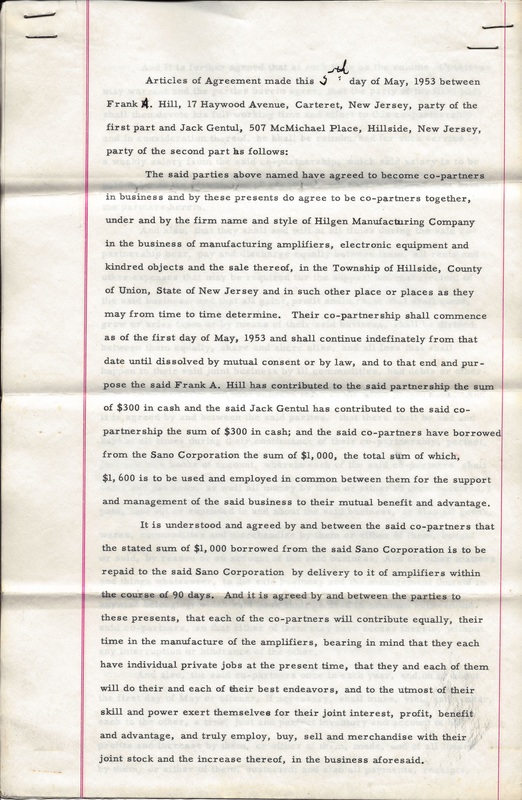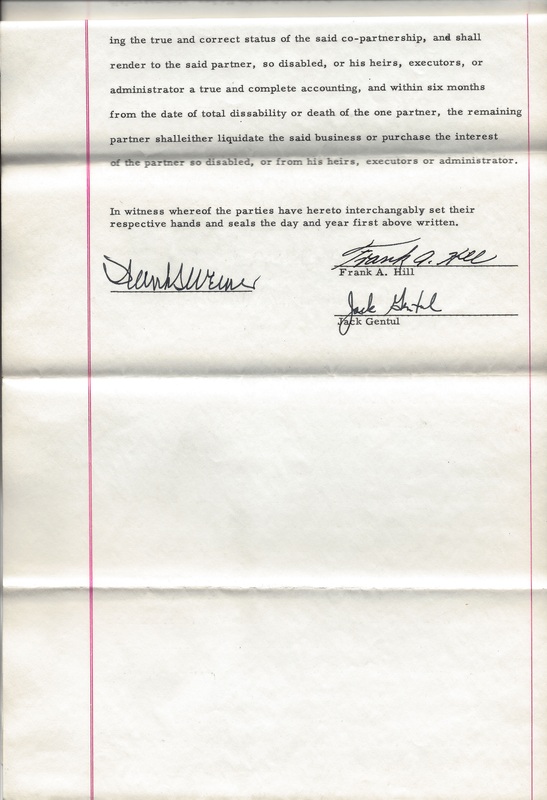As I have mentioned elsewhere on this site, it is an article of faith on the internet, including Wikipedia, that the name "Hilgen" was derived by combining the first syllable of the word "Hillside" with the first syllable of "Gentul." Several months ago I stated on this website that that belief is incorrect, and that the first syllable represents the first three letters of Frank Hill's last name.
It was not altogether unreasonable for internet sources not to have accepted my explanation at that time.
I had originally assumed that the "Hilgen" name was created in the mid-1960's when Mr. Gentul first began building amplifiers explicitly branded as "Hilgen." There was a serious inconsistency in that hypothesis that I could not previously explain. Frank Hill was Jack's co-worker at Brook Electronics, where Jack first became involved in amplifier engineering. So far as I knew, Jack had left Brook Electronics in 1952 or 1953. I had no evidence that Jack continued an association with Frank Hill thereafter. There was no plausible reason (except for sentiment, which seemed improbable) why, during the mid-1960's, Jack would have incorporated his former co-worker's last name into the brand name "Hilgen."
As it turns out, my assumption that the name "Hilgen" originated with the launch of Hilgen-branded amplifiers was wrong. In fact, Messrs. Hill and Gentul had formed a partnership in 1953 for the purpose of manufacturing guitar amplifiers and related equipment. At that time, they named their enterprise the "Hilgen Manufacturing Company." Set forth below are the first and last pages of that partnership agreement:
It was not altogether unreasonable for internet sources not to have accepted my explanation at that time.
I had originally assumed that the "Hilgen" name was created in the mid-1960's when Mr. Gentul first began building amplifiers explicitly branded as "Hilgen." There was a serious inconsistency in that hypothesis that I could not previously explain. Frank Hill was Jack's co-worker at Brook Electronics, where Jack first became involved in amplifier engineering. So far as I knew, Jack had left Brook Electronics in 1952 or 1953. I had no evidence that Jack continued an association with Frank Hill thereafter. There was no plausible reason (except for sentiment, which seemed improbable) why, during the mid-1960's, Jack would have incorporated his former co-worker's last name into the brand name "Hilgen."
As it turns out, my assumption that the name "Hilgen" originated with the launch of Hilgen-branded amplifiers was wrong. In fact, Messrs. Hill and Gentul had formed a partnership in 1953 for the purpose of manufacturing guitar amplifiers and related equipment. At that time, they named their enterprise the "Hilgen Manufacturing Company." Set forth below are the first and last pages of that partnership agreement:
Electro-archaeology is a humbling discipline. However, with the publication of the above document, I respectfully submit that there is no longer any evidentiary basis for the theory that the name "Hilgen" has anything to do with "Hillside, New Jersey."
The Agreement, along with other documents I have recently received, changes substantially my understanding of Jack Gentul's endeavors after (and perhaps even during) his time at Brook Audio. It appears that, in two different incarnations, Hilgen Manufacturing Company both preceded and followed Jack's work at Sano. Moreover, Hilgen Manufacturing Company itself was responsible for more than the Hilgen-branded line of amps -- for example, the Hilgen-built Excelsior amplifiers. Finally, Jack's work in musical electronics after Hilgen was considerably more significant than I previously realized.
Look for revisions to my history of Hilgen in the very near future.
The Agreement, along with other documents I have recently received, changes substantially my understanding of Jack Gentul's endeavors after (and perhaps even during) his time at Brook Audio. It appears that, in two different incarnations, Hilgen Manufacturing Company both preceded and followed Jack's work at Sano. Moreover, Hilgen Manufacturing Company itself was responsible for more than the Hilgen-branded line of amps -- for example, the Hilgen-built Excelsior amplifiers. Finally, Jack's work in musical electronics after Hilgen was considerably more significant than I previously realized.
Look for revisions to my history of Hilgen in the very near future.



 RSS Feed
RSS Feed